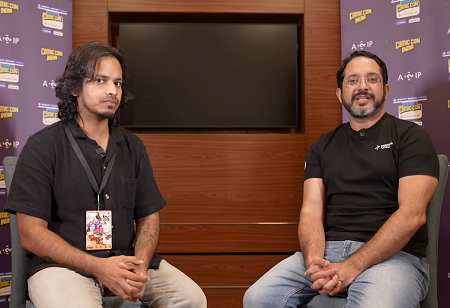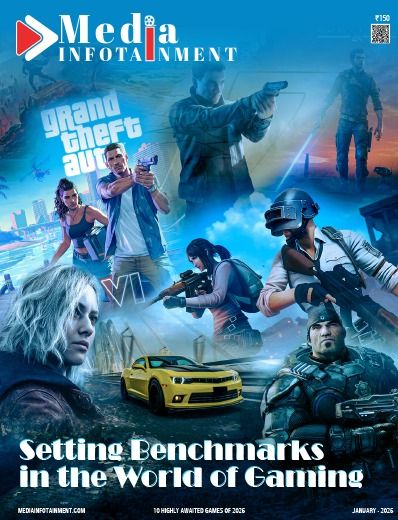The Rise of India's Indie Gaming Ecosystem
India’s gaming industry is booming, moving beyond niche status to global recognition. Raji: An Ancient Epic showcased local talent, while events like Indie Game Utsav and supportive programs fuel growth. In an exclusive IGN India interview, Avichal Singh, co-founder of Nodding Heads Games and Akshat Rathee, the co-founder of NODWIN Gaming discuss how creativity, strategy, and community are shaping India’s gaming revolution.
India Emerges As Gaming Hub
The Indian gaming industry is seen as a largely untapped market. As the world talks about international video games such as Cyberpunk 2077, God of War, and Elden Ring, Indian gamers are usually left wishing to have their own localized versions that are as big, deep, and polished as the global giants.
Over the years, PC games in India were viewed as an esoteric group of developers with limited paying potential in the country, which is believed to have a low paying capacity of digital entertainment. However, the recent trends are questioning this story, proving that India is not only willing to play games but also is willing to invest in good content.
The breakthrough came with the success of the game Raji: An Ancient Epic by Avichal Singh and his group at Noddwind Games. This widely acclaimed title did not only acquire an international status but also demonstrated the potential of Indian storytelling and talent at the international level.
Together with Akshat Rathee, the co-founder of Nordwind Gaming, Avichal has been on the front lines in promoting and amplifying the indie game development scene in India, including at the Indian Harvest Festival, which took place in 2021, and at Mumbai Comic Con, the Indie Game Utsav. These initiatives underscore a developing ecosystem that supports creators and, at the same time, entertains the gaming community.
The Breakthrough: Raji and the Birth of a Movement
The turning point came with Raji: An Ancient Epic, developed by Avichal Singh and his team at Nodding Heads Games. The game, steeped in Indian mythology and artistry, captured international acclaim and became a symbol of what Indian talent could achieve on the global stage.
Alongside Akshat Rathee, co-founder of Nordwin Gaming, Avichal has been instrumental in promoting India’s indie ecosystem. Their initiatives, such as the Indian Harvest Festival (2021) and Indie Game Utsav at Mumbai Comic Con, have become key platforms for nurturing and showcasing homegrown talent. These events highlight a growing community of developers, artists, and gamers who are building an ecosystem that’s as creative as it is collaborative.
Also Read: Optimizing for AI Search: Beyond Classic SEO Practices
Funding and Mentorship Boost Developers
India is not going through the indie renaissance alone. Today, developers have an excess of funding opportunities, mentorship programs, and publication partners that were not available a decade ago.
Programs such as the Microsoft Xbox Developer Accelerator, India Hero Project by Sony, Krafton Incubator, and the MegaGrants offered by Epic Games not only offer financial support but also essential technical and marketing support. Some universities have also begun to provide grants and workshops to foster early-stage innovation.
Avichal remembers that the process of Raji was not easy at all; a failed Kickstarter campaign because of low visibility was a lesson to the team that it is halfway to making a great game. The other half knows about marketing, distribution, and monetization. Their success eventually highlights a crucial truth that every indie developer should know that creativity should be accompanied by business skills.
The Global Market is teaching us about Learning
Conferences and events such as Indie Game Utsav are crucial in connecting Indian developers to international publishers, including Devolver Digital, Raw Fury, and Epic Games. Such partnerships not only provide mentorship and exposure but also invaluable feedback that can be used to polish the games of local developers to appeal to international markets.
The 2023 Indie Game Utsav included 118 games on Steam, and this is an impressive variety of genres, horror adventures, and artistic platformers. Every title, successful or not, helps to bring about a more significant cultural change, showing that the representatives of the indie community in India are not inferior to the creators all over the world.
India’s Expanding Gaming Footprint
India’s gaming ecosystem today looks dramatically different from even five years ago. Rapid improvements in digital infrastructure, smartphone penetration, and payment systems like UPI have made gaming more accessible than ever. India now ranks among the top three countries in sales for Raji on Steam, a testament to both the game’s quality and the growing willingness of Indian gamers to support local content.
The success of Indie Game Utsav embodies this transformation, creating a space where developers, publishers, and players collaborate to celebrate creativity. It’s also proof that Indian games can thrive globally while resonating locally, a balance that defines the future of the industry.
Also Read: PM Modi's GST Festival: A Masterclass in Marketing Communication
Advice for Aspiring Developers
For anyone hoping to break into India’s game development scene, the advice from Avichal Singh and Akshat Rathee is straightforward and full of real-world insight. The first step, they say, is to understand the market. Before jumping into development, it’s important to study how Indian gamers think—what they like to play, how they spend money, and which platforms they prefer. Knowing what players value helps developers create games that truly connect with them.
The next step is to seek mentorship and funding. Game development can be a tough journey, and going solo makes it even harder. There are now plenty of grants, incubators, and publisher programs, both in India and abroad, that offer funding, guidance, and technical support. Learning from experienced developers and industry mentors can make all the difference when turning an idea into a successful game.
Avichal and Rathi also stress the importance of sharing your work early. Getting feedback from the community during development helps improve gameplay, spot potential issues, and understand what players actually expect. This not only saves time and resources later but also builds a loyal fan base that grows alongside the project.
Another key lesson is to focus on delivering value. Indian gamers are willing to pay for good content, but they expect it to be worth their time and money. Games that offer meaningful stories, satisfying gameplay, and emotional depth are the ones that tend to last and build long-term success.
As Avichal notes, “ Don't build and hope someone will come. No one owes you anything. If you have to do business you have to understand what a game is made for and how it will make money.”
Finally, every developer needs a clear distribution plan. Even the best games can go unnoticed without smart marketing and pricing strategies. Having a solid plan for how the game will reach its audience—whether through Steam, mobile stores, or publisher partnerships—is just as important as the game itself.
Avichal and Rathi remind aspiring developers that making a great game is only the beginning. True success comes from strategy, persistence, and the ability to learn from both failures and achievements. The future of India’s indie gaming industry is bright, but it will belong to those who are willing to understand the market, stay adaptable, and keep improving with every step.
A Bright Future for Indian Gaming
The Indian indie game scene is at an inflection point. Events like Indie Game Utsav, the success of titles like Raji, and the growing support ecosystem for developers signal a vibrant future. India may not yet produce games on the scale of Elden Ring, but the industry is maturing rapidly, and the foundation for globally competitive titles is being laid.
By fostering collaboration, understanding local gamer behavior, and combining it with global expertise, Indian developers can create games that resonate both domestically and internationally. For Avichal, Rathi, and the wider gaming community, the goal is clear: cultivate a healthy, sustainable industry where creativity and business acumen go hand in hand, ensuring that Indian games are not just played but celebrated worldwide.
India’s indie gaming revolution is not just about creating games; it’s about understanding the market, leveraging opportunities, and building a self-sustaining ecosystem. With the right combination of talent, mentorship, and strategy, the country is poised to emerge as a significant player on the global gaming stage. As Avichal and Rathi emphasize, the time to act is now—the only other best time was yesterday.
Also Read: How Storytelling Campaigns Drive Brand Engagement in 2025
About the Authors
Avichal Singh
Avichal Singh is an Indian game designer and co-founder of Nodding Heads Games, where he leads the creative design of their projects. He is best known for Raji: An Ancient Epic, an award-winning action-adventure game released in 2020 that combines Indian mythology with puzzle-platforming gameplay. Before founding his own studio, he worked on game documentation and design theory at Zynga. Based in Pune, Singh focuses on telling culturally rich stories through games and continues to make his mark in the indie gaming scene, earning recognition at events like the India Game Developer Conference.
Akshat Rathee
Akshat Rathee is a visionary entrepreneur and co-founder of NODWIN Gaming, India’s leading esports company, which he helped establish in 2014. As Managing Director, he has grown NODWIN into South Asia’s largest esports organization and one of the top three globally, hosting major tournaments and expanding into markets like South Africa. With a finance background from Ernst & Young, Rathee also mentor startups, invests through Good Game Investments, and advocates for gaming as both a cultural and economic force.
🍪 Do you like Cookies?
We use cookies to ensure you get the best experience on our website. Read more...






